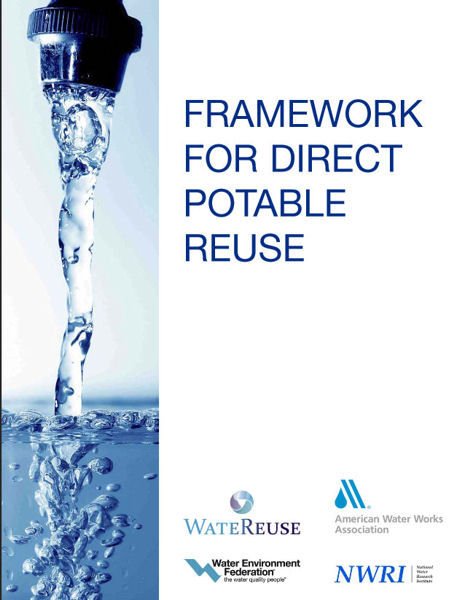
Click to access the Framework for Direct Potable Reuse report. Photo courtesy of the WateReuse Association (Alexandria, Va.).
In response to the many U.S. communities seeking new strategies to develop sustainable water supplies, water sector organizations developed the document, Framework for Direct Potable Reuse. The framework, which is available for free to download, will help state regulatory agencies and utilities develop guidelines for safely converting wastewater into municipal drinking water through the emerging practice of direct potable reuse (DPR).
The new framework is the result of a collaborative effort between the Water Environment Federation (WEF; Alexandria, Va.), the WateReuse Association (Alexandria, Va.), and the American Water Works Association (Denver) with the support of an independent advisory panel administered by the National Water Research Institute (Fountain Valley, Calif.).
“The water sector is transforming wastewater treatment into full resource recovery that provides valuable, renewable products,” said WEF Executive Director Eileen O’Neill. “This framework will help communities properly vet and consider incorporating DPR into their overall water management strategy.”
DPR involves the use of such advanced water treatment technologies as membranes, reverse osmosis, and advanced oxidation to remove viruses, bacteria, chemicals, and other contaminants that may be present in wastewater. Current state and federal regulations were not developed with these technologies in mind.
The framework was prepared by a panel of seven experts with backgrounds in water and wastewater treatment, water quality policy and regulations, water resource planning, and public health risk assessment. It provides a context for DPR, including the costs, benefits, energy requirements, and comparative issues with other water sources and measures. It also examines the three key components of a DPR program including
- regulatory considerations, for example, measures to mitigate public health risks;
- technical issues related to the production of advanced treated water; and
- public support and outreach.








December 17, 2015
Learning Opps, WEF Resources & Efforts